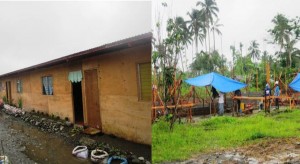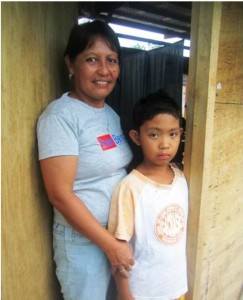
The municipal building of New Bataan in Compostela Valley is teeming with people going about their transactions. The mini-wet market nearby is likewise crowded mostly by women buying fresh fish and vegetables. Chattering school children can be seen coming out from their classrooms in the adjacent elementary and high school buildings. Motorcycles, tricycles, buses and the unique “skylab” continue to ply the highway. It is already “Business as Usual” in this once devastated town.
A short distance away from the municipal hall are the bunkhouses where victims of typhoon “Pablo” now reside while their permanent shelters are undergoing construction. The bunkhouses were constructed by the provincial government of Compostela Valley with funding assistance from the Department of Social Welfare and Development (DSWD). For the families here, life is returning to normal.

In Unit No. 57, Normelita “Neneng” Rivera, 45 years old, and her neighbors are busy preparing for the launching of the communal garden. They are making the labels for the seedlings that they will be planting. The seedlings were donated by Operation Compassion, an international humanitarian organization helping the affected families cope with their situation by planting fast growing crops, such as okra, tomatoes, and pechay.
A volunteer shared that each family is given a plot and five different kinds of seedlings. The plants can be harvested in a month, and the excess harvests can be sold in the public market providing them with a source of income.
The idea of a communal garden is very much welcome. “A communal garden will augment our food sources and provide us with livelihood, so we are not just dependent on food rations. Working in the garden is also a positive thing to do, rather than sitting around dwelling on the past tragedy. It is one of the projects that we keep busy with, helping ourselves towards recovery,” Neneng explained.
Better place
Neneng was elected president of the bunkhouses neighborhood association comprising of 72 families.
“We have organized ourselves to oversee the various concerns in our small community, such as sanitation and maintaining the cleanliness of our surroundings. Likewise, we support one another, encouraging and strengthening each other,” Neneng quipped.
She pointed to the posters pasted on the walls of the bunkhouses reminding the residents to keep their surroundings clean as a precaution against dengue and other diseases.
While her husband, Geronimo Rivera, Jr., 47 years old, works as a part-time construction worker, Neneng keeps busy attending to her children and the community’s needs. “I used to work in a beauty parlor in Tagum City, but after ‘Pablo,’ I have to stay here and take care of our children, the youngest of whom is 10 year-old Jan Ryan,” she narrated.
Neneng and her family are among those who were prioritized for the bunkhouses because two of their children are persons with disabilities. Her father, 80 year-old Raymundo Tuba, also stays with them, as well as her 21 year-old nephew Jessie Rivera.
Like other displaced families, Neneng’s family receives a family food pack every two to three weeks. The food packs, containing basic commodities, such as rice, noodles, assorted canned goods, and coffee provided by DSWD, are distributed to the affected families through the local government unit of New Bataan. International and local humanitarian organizations also donate some goods every now and then.
Rising from disaster
Gloria Diaz Bosbos, 48 years old, a Pantawid Pamilyang Pilipino beneficiary and a parent leader recalled the terrible tragedy that befell them on that day. Knowing that hundreds died in their town, Gloria feels so thankful that “we are all still together, and we have a place to stay,” she enthused.
Gloria and her husband, Arturo Bosbos, 53 years old, also a part-time construction worker, have six children with ages ranging from nine to 24 years old. She considers their bunkhouse unit as their haven.
Neneng, Gloria, and the other women in the neighborhood try to make the bunkhouses homey by adding little touches, such as curtains in the windows, flower pots, and colorful posters on the walls.
“We are all looking forward to moving into our own homes. Once settled, we know that there will be better days ahead of us,” they ended. ###


